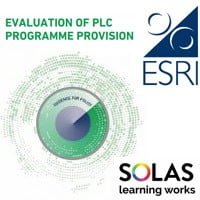 New ESRI research finds that PLC courses have positive outcomes for students in terms of accessing employment and progressing to higher education. However, the study finds that PLC courses could be more responsive to changing labour market needs. The types of courses have not changed over time despite dramatic changes in the types of jobs available in Ireland.
New ESRI research finds that PLC courses have positive outcomes for students in terms of accessing employment and progressing to higher education. However, the study finds that PLC courses could be more responsive to changing labour market needs. The types of courses have not changed over time despite dramatic changes in the types of jobs available in Ireland.
Approximately 32,000 learners are currently enrolled in Post-Leaving Certificate (PLC) courses, the largest component of full-time further education and training in Ireland. New research from the ESRI shows that PLC courses enhance employment chances and progression to higher education for learners but could be made more responsive to a changing labour market. The study is based on new surveys of PLC principals and PLC and Leaving Certificate leavers.
Outcomes for PLC learners
- PLC learners were 16 per cent more likely to be in employment and 27 per cent more likely to have progressed to higher education after completing their courses than those who left education after the Leaving Certificate and had similar characteristics.
PLC programme objectives
- PLC courses serve a number of objectives: vocational education and training for young people, second-chance education for older adults, and a progression route into higher education.
- A stronger distinction is required between programmes focused on preparing students for immediate entry to the labour market and those where the emphasis is on facilitating progression to higher education.
PLC and the labour market
- The types of PLC courses offered have not changed markedly over time even though there has been a dramatic shift in the kinds of jobs available in the Irish labour market. Decisions around which course to offer tend to be driven by student demand rather than skill needs in the economy. There is therefore a need to develop systems to ensure that those PLC courses focused on the labour market are aligned with employer requirements and responsive to changing labour market needs.
- Employer engagement at local level is crucial. Around half of PLC principals report that their staff meets with local employers frequently (at least three times a year) but this is less common for smaller PLC providers.
- Not all PLC learners feel prepared for the world of work. Over a fifth report not having taken part in a work experience placement during the course of their studies. Almost a third felt that their learning did not contribute to their employability and a quarter considered that they did not acquire job-related knowledge and skills.
Characteristics and experiences of PLC students
- One of the goals of PLC provision is to facilitate social inclusion. PLC learners are more likely to be from less educated family backgrounds, are more likely to be older and have children, and have a higher incidence of special educational needs than those who go on directly to higher education. Thus, PLC provision tends to provide access to educational opportunities for a socially diverse group.
- PLC students were largely satisfied with the relevance of courses and the vast majority felt their teachers and tutors had the required knowledge and were supportive.
- PLC courses are still seen as a compromise, in a context of not achieving sufficient grades to pursue higher education, highlighting the continued lower status of further education in Ireland.
- Financial challenges constituted the single greatest difficulty for PLC students, largely because of less financial support from family and a higher incidence of caring responsibilities (compared to higher education students) which restricted their employment opportunities.
Professor Seamus McGuinness, an author of the report, said that: ‘The findings show positive outcomes for those who have completed PLC courses. At the same time, more could be done to ensure that PLC provision responds to on-going changes in the Irish labour market. It is also important to challenge the idea that PLC courses are ‘second-best’ compared to higher education.’
View the full report at https://www.esri.ie/pubs/RS61.pdf